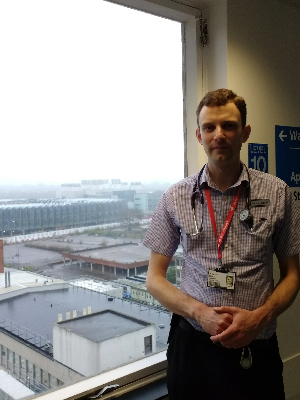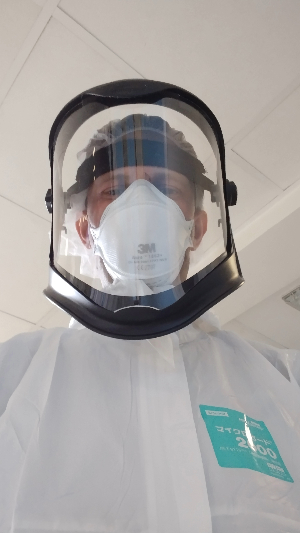The importance of cross-disciplinary collaboration: an interview with Jordan Skittrall
Posted on October 12, 2023 by Microbiology Society
The Microbiology Society is hosting the Federation of Infectious Science (FIS) conference in partnership with HIS and the BIA, on 14-15 November 2023 in Edinburgh and on 17 November online. FIS provides an excellent opportunity for academic, clinical and industry collaboration, to improve patient outcomes and foster innovative, cross-disciplinary research. The Microbiology Society’s Journal of Medical Microbiology encourages the publication of cross-disciplinary work in infectious diseases, including human and veterinary medical microbiology.
Ahead of this year’s conference, we spoke to Jordan Skittrall, who chaired a session at FIS in 2022, about the importance of collaboration. Jordan is a National Institute for Health and Care Research (NIHR) clinical lecturer in virology, postdoctoral researcher, and specialty registrar in infectious diseases and medical virology at the University of Cambridge, UK.
Please tell us about your current role and your career track so far.

I am a clinical lecturer, with protected time undertaking research that I can combine with completing my postgraduate medical training. For half of the year, I am a postdoctoral researcher, developing and applying methods to discover how viruses have solved key biological problems. For the other half of the year, I am a registrar in infectious diseases and medical virology, looking after ward patients or clinical laboratory diagnostics and needing to demonstrate the same clinical competencies (and pass the same postgraduate exams!) as my full-time clinical colleagues.
The path to where I am currently has been non-traditional. My first degree was in maths and I completed a theoretical physics PhD before vocation took me towards medicine. I started medical school unsure of where I wanted to specialise, or whether I would return to research. I came to recognise that practising in infection gave me a particular opportunity to help a group of people who had been let down by life or by society, and that I found the biology of viruses fascinating! After medical school, I went into the first of a succession of jobs where I could combine postgraduate clinical training with research, including a year employed by the NHS whilst I looked for more research time and a year's research fellowship from a small medical charity.
How do you balance clinical and research commitments, and what do you find most rewarding and challenging within these different aspects of your role?
It's hard! Either role could be full-time, and the demands of one don't put themselves on hold just because I am busy with the other. Time management is definitely one of the big challenges. Having dedicated time where the focus is on one or the other helps.
The key thing that I find helps is remembering that my focus is bridging between different areas – bringing the knowledge and experience from one field to provide direction and insight into another. I am not trying to be the best in a single field, in only half the time my excellent colleagues are devoting to it. I am trying to be very good at crossing disciplines. Focussing on where I can add most value is key. It's truly rewarding when I can work with one of my colleagues, taking a problem that seems intractable within their field alone and adding my knowledge and experience to theirs to find a way through that neither of us could have reached separately.
One of the real privileges of my particular role is the sheer variety in what I do. I get to look after sick people, work on optimising our diagnostics, address interesting problems in basic science, and teach and mentor bright students. It's a real blessing!
Your work uses applied mathematics to study viral genomes, have you found having a background in an independent discipline has strengthened your clinical research?
Having studied maths not only gives me a different language for talking about problems but also equips me with a different way of formulating those problems. This puts me in a much better position to approach some questions than if I had a more traditional background. I therefore aim to focus on microbiological questions that my mathematical background – or my clinical background, or (ideally) both – allows me to approach in an innovative way.
My work on viral genomes is a great example of this. When I started working on HIV, I realised its genomic diversity meant we would have to refine our mathematical approach, and my background meant I could brainstorm solutions with a mathematical collaborator. I then had sufficient background to see how the solution we developed could be applied to circumvent a common issue in predicting RNA structure computationally, and my clinical background pointed me towards the potential to apply the biology we were learning to work towards discovering antivirals. Subsequently, I have chosen to study other viruses where I can foresee particular clinical applications of the work we have done, and the biological insights from those have, in turn, pointed me towards ways to refine the mathematical approach to get yet more biological information.
I would emphasise that a major effect of having this extra background is one of frequently being humbled (often I've got to the point in a field where I realise I need to seek help!) and of realising the value in repeatedly talking to others and seeking collaborators with knowledge and experience that adds to mine.
Which aspects of microbiology research do you think would benefit from collaboration with other fields?
This is a tough one, and I think I may end up ducking the larger question! One thing that working across disciplines has made me realise is that candidate areas for collaborative work really start to reveal themselves as one's appreciation of both disciplines increases. So, I can start to answer the question for my own cross-disciplinary area, but I am sure there are plenty of areas outside my specialism where I haven't begun to think of all the potential opportunities.

I would of course say that I see huge benefits to collaboration in my own area. Microbiology has a great wealth of genomic data that has only been interrogated superficially, and increasing the sophistication with which we can interrogate those data not only has potential to yield further insights but also helps direct the most efficient way to spend experimental time and resources. One of my current collaborative projects – involving wet work I could not have done alone – is more than a lot cheaper because of the computational work we undertook before starting: it is only tractable as a set of experiments because of that computational work.
Going outside my own disciplines, I have always found it fascinating as a clinician to realise how little I understand of both behavioural science and economics and what they can add to our understanding of how we can effectively approach infectious diseases. We saw so much of this during the height of the COVID-19 response, where a good deal of understanding the best option to curtail infections involved foreseeing the effects on society beyond case numbers, and understanding what society would find acceptable – or indeed would demand. Closer to home, it provides a real grounding to pondering the molecular biology of a virus such as HIV when I go to clinic and work with a person living with HIV facing a set of obstacles to taking medication. It also sparks real joy when I see a person living their normal life because of the past work of other researchers and clinicians!
What are the main challenges with carrying out cross-disciplinary work, how can this be made easier?
Working across disciplines entails a different way of thinking, and a major challenge to any cross-disciplinary work is that the world tends to be built to judge by the standards of individual fields. We all – even I – get into the habit of thinking that a good manuscript – or a good grant proposal, or a good career – looks a certain, stereotyped way. This yields an important challenge to us all: when we see something that looks very different from a usual pattern of success, or is couched in atypical language, is that because it is wrong (sometimes it is – one of my recurring worries is that I'll say something unwise because I don't know enough about a field!), or because it is surprising? We shouldn't be afraid to call out naïve approaches to crossing disciplines, but neither should we evaluate cross-disciplinary approaches with naivety.
Cross-disciplinary work, by definition, involves following non-traditional pathways. If there were a traditional pathway, it would be a single discipline! And doing it well therefore entails a substantial time commitment. We need to recognise, therefore, that true cross-disciplinary work has intrinsic value and getting good at it involves just as much commitment as becoming a leader in a more traditional field. Funders are starting to show more awareness of this – although it remains important to ensure that cross-disciplinary work is regarded as one of a number of pathways to success, not simply as a box everybody ought to tick to score higher in a funding round. We should continue conversations about how best to disseminate such work – how do we ensure research is accessible to appropriate audiences, and how do we ensure something is soundly evaluated when it crosses fields? We also need to equip the next generation of researchers and practitioners with tools to understand the languages of neighbouring disciplines – which may require us to re-evaluate delineations of teaching responsibilities in academia.

